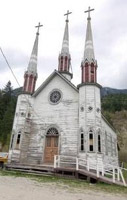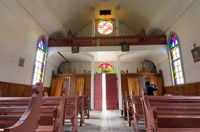
Church of the Holy Cross
 Lillooet Lake Road, Skatin (formerly Skookumchuk), British Columbia – NATIONAL HISTORIC SITE LEFT OUT IN THE COLD
Lillooet Lake Road, Skatin (formerly Skookumchuk), British Columbia – NATIONAL HISTORIC SITE LEFT OUT IN THE COLD
Although the federal government is engaged in commemorating Canada’s national historic sites, its cost-sharing program to support non-federally-owned national historic sites is nearly dormant and badly under-funded.
Since being declared a National Historic Site in 1981, there have been no federal funds to provide support, emergency or otherwise, to the Church of the Holy Cross.
Background
Located in the remote village of Skatin on the Skatin First Nation (75 km southeast of Whistler), the Church of the Holy Cross is one of Canada’s least known National Historic Sites and perhaps one of its most endangered. Since 2003, the community group Ama Liisaos (Good Angels) has been struggling to raise funds to repair the damaged church after the flooding Lillooet River undermined its foundation and destabilized its steeples.
In recent months a new foundation has been put under the building and the steeples temporarily braced, completing the emergency stabilization phase of the restoration. Almost all of the $200,000 for this emergency work came from small donations from across Canada. The final three phases of work will address the wooden exterior of the building, safety and sprinkler systems, and roofing, but fundraising for the approximately $450,000 required is going slowly—the remote location of the church has limited its public profile.
 Meanwhile, with every wind or ice storm pieces of siding and decorative woodwork are torn off the church; in April an entire stained glass window and frame fell out of the church tower, but, miraculously, sustained no damage.
Meanwhile, with every wind or ice storm pieces of siding and decorative woodwork are torn off the church; in April an entire stained glass window and frame fell out of the church tower, but, miraculously, sustained no damage.
Between the mid-1890s and 1905, the people of the Stl’al’imx Nation built this Gothic Revival “cathedral in the wilderness” out of local cedar. None of them had formal carpentry training. Instead, they relied on photographs of the French Gothic cathedrals of Chartres and St. Denis for inspiration. They crafted three delicate steeples, hand-carved the altar, pews and interior detailing, and imported stained glass windows from Europe.
“People who visit the church talk of the incredible sense of peace and power in it,” says local resident Sharon Syrette. “There is a tangible presence in that place, whatever your beliefs.” Five generations of the Syrette family have been baptized there.
Top 10 Endangered Places
- Explore Past Listings
- National
- British Columbia
- Vancouver’s Chinatown
- Main Post Office
- Paramount Theatre
- Point Grey Secondary School
- Riverview Hospital
- Sinclair Centre
- Vancouver - Kitsilano
- Vancouver West Side Character Homes and Gardens
- Pantages Theatre
- Peace River Valley
- Church of the Holy Cross
- Old St. Patrick's Roman Catholic Church
- E & N Railway Roundhouse
- Officers’ Mess and Quarters, Work Point Military Base
- Burrard Bridge
- Woodward’s
- Vogue Theatre
- Alberta
- Saskatchewan
- Manitoba
- Ontario
- Quebec
- New Brunswick
- Nova Scotia
- Prince Edward Island
- Newfoundland and Labrador
- Territories
- Worst Losses Archive
- Nominate a Site
